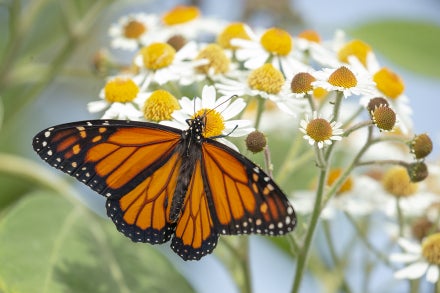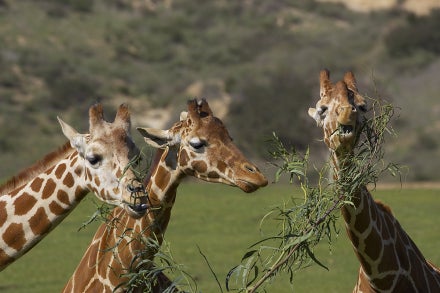Image

The San Diego Zoo Safari Park is home to 10 adult Ruppell’s vultures. These birds are a large African vulture species that are facing very difficult times in the wild and were recently uplisted to Critically Endangered. They are critically endangered due to multiple factors but the biggest challenge they currently face is poisoning (both direct as well as indirect). Many efforts are needed to help to try and save this species, and one of those efforts is through breeding in managed care—and this is where the Safari Park steps up to the plate.
The San Diego Zoo Safari Park has had a Ruppell’s vulture breeding program in place since 1996 and we are currently the only facility in North America producing these vultures. Our first chick hatched in 1997 and we have since produced a total of 26 chicks. This is a huge accomplishment and we are so very proud of our program!
Like most vulture species, Ruppell’s have a slow reproductive rate and lay only one egg each year. Both the male and female share the parental responsibilities of incubating the egg for 56 days and rearing the chick until it leaves the nest (fledges) at about 150 days old. The parents feed the chick all the food it needs up until the day it fledges, so it is very dependent on them. This means that for more than 200 days a year, the adults' energies are taken up with the production of just one chick—which is why they only lay one egg a year.
[caption id="attachment_120651" align="aligncenter" width="910"] This Ruppell's pair at the Safari Park found what they feel is a secure site for their nest; with the fence providing protection from behind, they can keep an eye on what's happening in front of them.[/caption]
Ruppell’s vultures are a highly charismatic and intelligent species. I have been lucky enough to work with them for five years, and been their primary keeper for a little over two years. We currently have two pairs of Ruppell’s that consistently reproduce every year and one new pairing that has just laid their very first egg together. Breeding season for these vultures starts in late fall/early winter. This season our first egg was laid November 1, 2016 and the other two pairs laid shortly after.
When the birds' breeding season approaches, we begin to provide them with lots of nesting materials, primarily consisting of sticks and grasses. They build a very large stick nest and then line the top with green plant material that they shape into a bowl where they will lay their egg. Once the female lays the egg (and sometimes even before she does so), both parents become very protective of their nest and the area around it, chasing off any critters that come near. The Ruppell’s parents are doing a great job incubating and protecting their eggs and we are proud to announce that the first chick of this season just hatched on December 29,2016. The next pair’s chick is due in early February! These vultures nest in the African Bird habitat found along the path of the Africa Tram—watch for them on your next visit.
Lauren Wright is a keeper at the San Diego Zoo Safari Park.
This Ruppell's pair at the Safari Park found what they feel is a secure site for their nest; with the fence providing protection from behind, they can keep an eye on what's happening in front of them.[/caption]
Ruppell’s vultures are a highly charismatic and intelligent species. I have been lucky enough to work with them for five years, and been their primary keeper for a little over two years. We currently have two pairs of Ruppell’s that consistently reproduce every year and one new pairing that has just laid their very first egg together. Breeding season for these vultures starts in late fall/early winter. This season our first egg was laid November 1, 2016 and the other two pairs laid shortly after.
When the birds' breeding season approaches, we begin to provide them with lots of nesting materials, primarily consisting of sticks and grasses. They build a very large stick nest and then line the top with green plant material that they shape into a bowl where they will lay their egg. Once the female lays the egg (and sometimes even before she does so), both parents become very protective of their nest and the area around it, chasing off any critters that come near. The Ruppell’s parents are doing a great job incubating and protecting their eggs and we are proud to announce that the first chick of this season just hatched on December 29,2016. The next pair’s chick is due in early February! These vultures nest in the African Bird habitat found along the path of the Africa Tram—watch for them on your next visit.
Lauren Wright is a keeper at the San Diego Zoo Safari Park.
 This Ruppell's pair at the Safari Park found what they feel is a secure site for their nest; with the fence providing protection from behind, they can keep an eye on what's happening in front of them.[/caption]
Ruppell’s vultures are a highly charismatic and intelligent species. I have been lucky enough to work with them for five years, and been their primary keeper for a little over two years. We currently have two pairs of Ruppell’s that consistently reproduce every year and one new pairing that has just laid their very first egg together. Breeding season for these vultures starts in late fall/early winter. This season our first egg was laid November 1, 2016 and the other two pairs laid shortly after.
When the birds' breeding season approaches, we begin to provide them with lots of nesting materials, primarily consisting of sticks and grasses. They build a very large stick nest and then line the top with green plant material that they shape into a bowl where they will lay their egg. Once the female lays the egg (and sometimes even before she does so), both parents become very protective of their nest and the area around it, chasing off any critters that come near. The Ruppell’s parents are doing a great job incubating and protecting their eggs and we are proud to announce that the first chick of this season just hatched on December 29,2016. The next pair’s chick is due in early February! These vultures nest in the African Bird habitat found along the path of the Africa Tram—watch for them on your next visit.
Lauren Wright is a keeper at the San Diego Zoo Safari Park.
This Ruppell's pair at the Safari Park found what they feel is a secure site for their nest; with the fence providing protection from behind, they can keep an eye on what's happening in front of them.[/caption]
Ruppell’s vultures are a highly charismatic and intelligent species. I have been lucky enough to work with them for five years, and been their primary keeper for a little over two years. We currently have two pairs of Ruppell’s that consistently reproduce every year and one new pairing that has just laid their very first egg together. Breeding season for these vultures starts in late fall/early winter. This season our first egg was laid November 1, 2016 and the other two pairs laid shortly after.
When the birds' breeding season approaches, we begin to provide them with lots of nesting materials, primarily consisting of sticks and grasses. They build a very large stick nest and then line the top with green plant material that they shape into a bowl where they will lay their egg. Once the female lays the egg (and sometimes even before she does so), both parents become very protective of their nest and the area around it, chasing off any critters that come near. The Ruppell’s parents are doing a great job incubating and protecting their eggs and we are proud to announce that the first chick of this season just hatched on December 29,2016. The next pair’s chick is due in early February! These vultures nest in the African Bird habitat found along the path of the Africa Tram—watch for them on your next visit.
Lauren Wright is a keeper at the San Diego Zoo Safari Park.



